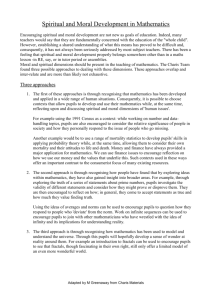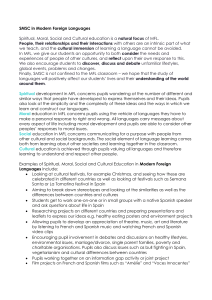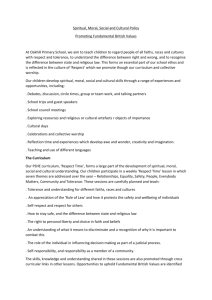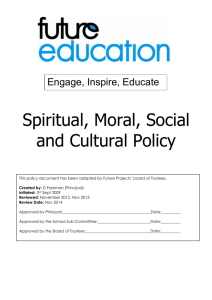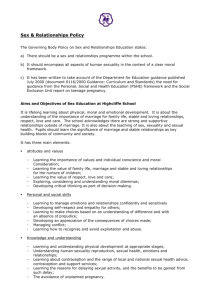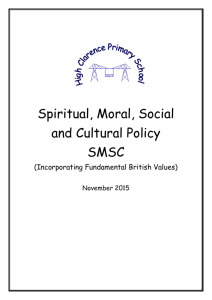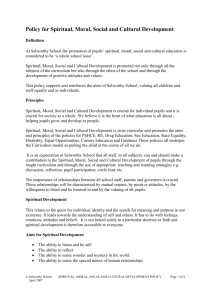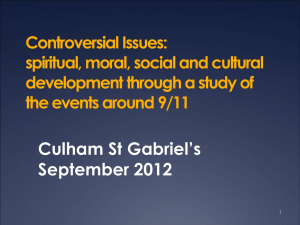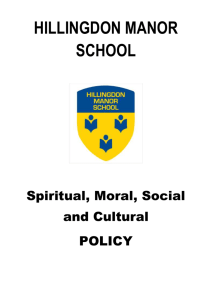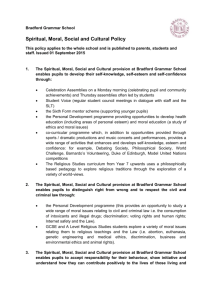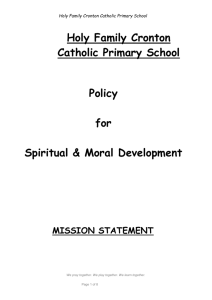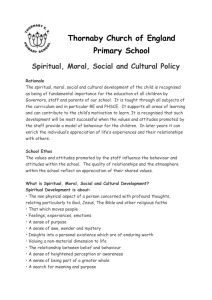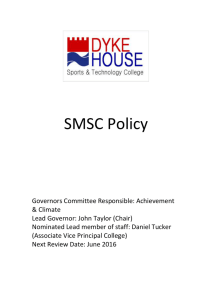Microsoft Word - SMSC Strategy
advertisement
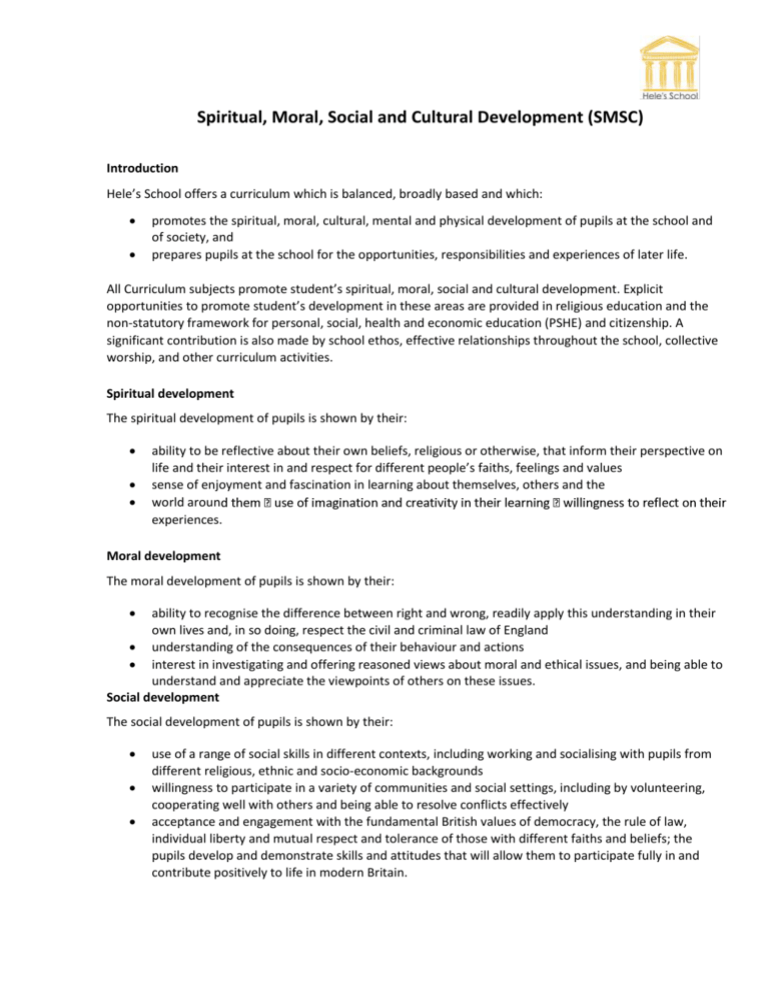
Spiritual, Moral, Social and Cultural Development (SMSC) Introduction Hele’s School offers a curriculum which is balanced, broadly based and which: promotes the spiritual, moral, cultural, mental and physical development of pupils at the school and of society, and prepares pupils at the school for the opportunities, responsibilities and experiences of later life. All Curriculum subjects promote student’s spiritual, moral, social and cultural development. Explicit opportunities to promote student’s development in these areas are provided in religious education and the non‐statutory framework for personal, social, health and economic education (PSHE) and citizenship. A significant contribution is also made by school ethos, effective relationships throughout the school, collective worship, and other curriculum activities. Spiritual development The spiritual development of pupils is shown by their: ability to be reflective about their own beliefs, religious or otherwise, that inform their perspective on life and their interest in and respect for different people’s faiths, feelings and values sense of enjoyment and fascination in learning about themselves, others and the world aroun experiences. Moral development The moral development of pupils is shown by their: ability to recognise the difference between right and wrong, readily apply this understanding in their own lives and, in so doing, respect the civil and criminal law of England understanding of the consequences of their behaviour and actions interest in investigating and offering reasoned views about moral and ethical issues, and being able to understand and appreciate the viewpoints of others on these issues. Social development The social development of pupils is shown by their: use of a range of social skills in different contexts, including working and socialising with pupils from different religious, ethnic and socio‐economic backgrounds willingness to participate in a variety of communities and social settings, including by volunteering, cooperating well with others and being able to resolve conflicts effectively acceptance and engagement with the fundamental British values of democracy, the rule of law, individual liberty and mutual respect and tolerance of those with different faiths and beliefs; the pupils develop and demonstrate skills and attitudes that will allow them to participate fully in and contribute positively to life in modern Britain. Cultural development The cultural development of pupils is shown by their: understanding and appreciation of the wide range of cultural influences that have shaped their own heritage and that of others understanding and appreciation of the range of different cultures within school and further afield as an essential element of their preparation for life in modern Britain knowledge of Britain's democratic parliamentary system and its central role in shaping our history and values, and in continuing to develop Britain willingness to participate in and respond positively to artistic, sporting and cultural opportunities interest in exploring, improving understanding of and showing respect for different faiths and cultural diversity, and the extent to which they understand, accept, respect and celebrate diversity, as shown by their tolerance and attitudes towards different religious, ethnic and socio‐economic groups in the local, national and global communities. At Hele’s School each student has the opportunity to promote their own spiritual, moral, social and cultural development through the school ethos of Active Learning: Achieving Challenged Thoughtful Independent Valued Engaged In addition, the school recognises its responsibility to ensure this entitlement so that our students can develop into well rounded, confident adults and responsible, open‐minded citizens with an appreciation of life in modern Britain. Each student has the opportunity to: Develop a wide range of social skills and a sense of social responsibility Learn to effectively manage their relationships in all contexts Learn the importance of tolerance and respect for each other as individuals and in groups Gain broad knowledge of the community, society and the world, and understand the nature of citizenship Understand their rights, responsibilities and obligations as citizens Prepare themselves for life in modern Britain Conform to fundamental British values of belief in democracy, the rule of law, individual liberty and mutual respect of other faiths and beliefs. Develop their understanding of right and wrong and a code of moral values based on universal moral principles Consider moral dilemmas and try to reach judgments based on universal moral principles Be exposed to spiritual experiences and develop their own spirituality through empathy, reflection and response. Consider the spiritual dimension, recognise spiritual questions and find their own sense of meaning through this activity Understand their own cultural heritage and explore it across the curriculum Participate in a wide range of cultural activities within the Academy and through extra‐curricular activities Recognize themselves as part of a multi‐cultural society, learn to appreciate the richness, value and contribution of all cultures. Develop positive attitudes towards living in a multi‐cultural society and understand the importance of equal opportunities within it. These opportunities are provided for students across the curriculum through social development and interaction via co‐operative work as well as more explicitly through: The tutorial programme include an SMSC session and ‘theme for the week’ Themed assemblies Extra‐curricular activities such as involvement in the performing arts and sport Our citizenship week, ‘[date]’ 2015 which this year will focus on the General Election Each Head of Department is responsible for making explicit and documenting those aspects of SMSC pertinent to their curriculum area. This is mapped through the whole school. PSHE at KS3 and the PSHE days at KS4 make major contributions to social, moral, spiritual and cultural development. The PSHE Coordinator is Dr Alan Kent. Impact of SMSC Strategy Absence has dropped from 2013 5.2% to 4.5% in 2014, lower than national average. Behaviour within lessons and incidences of poor behaviour outside of lessons has reduced with the number of Detentions falling by in 2013-14. Students that join Hele’s through the ‘hard to place panel’ usually fare very well, quickly adapting to the high standards, an going with the ‘critical mass’ who behave well and are welcoming to in-term admission starters. Students have embraced the opportunities for leadership within the school and this is reflected in lesson observations that are undertaken by the SLT. Student Voice groups are well attended and a culture is developing of student led activities. The new school uniform brought in in 2013 is worn with pride and the four uniform checks per academic year indicate that 0ver 90% of students are always in correct uniform. Anecdotal evidence from visitors to the Academy informs us that our students are respectful and welcoming to guest speakers, tutors and other professionals. ‘Example text from positive feedback….’ Improvements to the physical environment & fabric of the school since 2010 has reduced incidences of vandalism and graffiti to virtually zero. Incidences of racial and homophobic abuse are very low suggesting that tolerance and recognition of individual differences embedded. The numbers of fixed term exclusions remains low, and there have been no permanent exclusions for over 10 years.. September 2014
